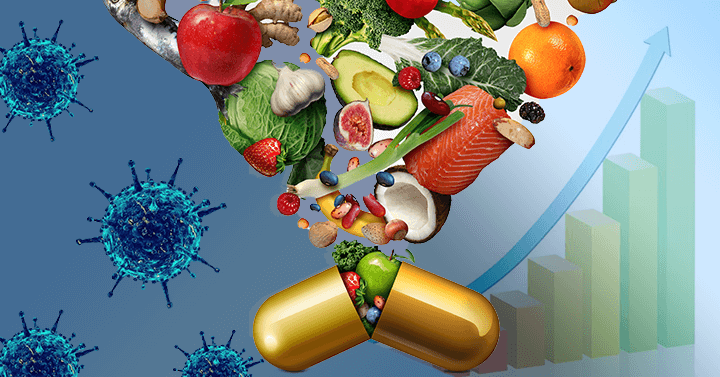Corona virus disease 2019 (COVID-19) current pandemic has affected many countries overall worldwide. When treatment strategies are not yet successful and vaccines are not available, vitamins are the best choice to protect against this viral infection.
Vitamins C and B delivered maximum energy scores against both targets and vitamin D displayed a binding energy score. The effectiveness of all three vitamins is higher than the binding energy score. Although the potential beneficial effects of vitamin C and B are revealed through studies, further clinical trials are required for the validation of these results.
The current COVID-19 pandemic is teaching significant adjustment for everyone.
We give an overview of the different agents that may have a role in the treatment or prevention of COVID-19 based on a review of the most current literature. It is important to note, however, that no clinical studies with supplements and vitamins have been completed in humans that are specific to COVID-19.
Vitamin D
Vitamin D have main role in immune functioning. VDR and Vitamin D have a suppressive effect on anti-inflammatory and autoimmunity effects on immune cells.
Vitamin D reduces the risk of acute respiratory infections among all patients, especially in those with deficient levels of vitamin D.
Zinc
The antiviral activities of zinc have made its ionospheres candidates and mineral against COVID-19. Zinc is essential for the integrity of the immune system, with an important role in the development, activation and maintenance of cells during adaptive and innate immune responses. It also plays a main role in the integrity of barriers, which are essential for organism prevention and defense of pathogen entry. Zinc can modulate the activity and development of T cells, hence characterized by high levels of pro-inflammatory chemokines and cytokines. It can lead to immune response impairment, resulting in acute respiratory distress syndrome (ARDS) or in multiple organ failure. Zinc deficiency decreases the activity of cytolytic T cells and natural killer (NK) cells both of which are involved in the destruction of tumor cells, viruses and bacteria.
Zinc is also useful in direct antiviral activity, which makes it essential for the immune response upon viral infection. Increased intracellular concentration of this mineral can reduce the replication of a variety of RNA viruses and interfere with the viral proteolysis processing of polyproteins. Zinc deficiency affects approximately one-third of the population worldwide and is affecting population groups in both developed and developing countries or also considered a global nutritional problem. It is also considered one of the main causes of morbidity in developing countries and it is estimated that 0.5 million women and children die per year in these countries due to zinc deficiency. Worldwide, about 16% of lower respiratory tract infections occur due to zinc deficiency, suggesting a possible link between this nutritional deficiency and severe disease progression and the increased risk of SARS-CoV-2 infection.
Vitamin C
Vitamin C protects damage to bimolecular resulting from exposure to oxidants generated by normal metabolism. It exposes to toxins and pollutants. Vitamin C is a cofactor of several that are involved in the stabilization of the collagen tertiary structure. It is important for the occurrence of events.
Vitamin C levels in the body can change due to environmental conditions like air pollution and the presence of pathologies such as type 2 diabetes. The elderly population is particularly affected by vitamin C deficiency because chronic or acute diseases are prevalent in this group, and aging is related to reduce vitamin C levels. For example, low levels of vitamin C in a population of British elderly individuals were associated with all causes including cardiovascular causes. In addition, older age and low vitamin C levels appeared to be co-dependent risk factors for mortality and suggesting that serum vitamin C levels contributed to the significance of age as a predictor of mortality.
Omega-3 fatty acids
Omega-3 fatty acids are polyunsaturated fatty acids. It includes docosahexaenoic and eicosapentaenoic fatty acids. It has well known effects on immunity and inflammation. Decision by the European Society for Parenteral and Enteral Nutrition expert statement, the use of omega-3 fatty acids can improve oxygenation in COVID-19 patients. Others however have suggested caution in the use of the omega-3 s in COVID-19 patients, citing evidence showing a counter-intuitive increase in inflammation and oxidative stress due to increased susceptibility of cellular membranes to damage.
Vitamin E and Selenium
The anti-oxidant Vitamin E and selenium are major components of anti-oxidants. Epidemiological studies demonstrate that deficiencies in either of these nutrients alters viral pathogenicity and immune responses. It has been noted, that there is a correlation between COVID-19 cure rates and geographic selenium levels in different Chinese provinces. Selenium and Vitamin E both act through anti-oxidant pathways to increase IL-2 cytokine secretion, increase the number of T cells and enhance mitogenic lymphocyte responses. It also enhances NK cell activity and decreases the risk of infection. Vitamin E and Selenium supplementation has also been shown to increase resistance to respiratory infections.
Adequate levels of vitamins C, E and D are crucial during COVID-19 to reduce symptom burden and lessen the duration of respiratory infection. It may improve immune responses and suppress viral replication. Therefore, the consumption of adequate amounts of minerals and vitamins through diet is essential to ensure the proper functioning of the immune system. Vegetables, fruits, fish, meat, fish, poultry and dairy products are good source of these vitamins and minerals. To support immune function during COVID-19 disease higher dietary intakes of vitamins C, D and E, zinc and omega-3 fatty acids could be beneficial.
Conclusion and future prospects
The effects of vitamins C, D, E, zinc, selenium and omega-3 fatty acids positively affect the immune system are shown above. Also the possible benefits to those suffering from COVID-19 are presented. Supplementation of higher dosage of vitamins D, zinc and C may have a positive effect during COVID-19 infection. However, clinical trials based on the associations of COVID-19 and diet are lacking. Some clinical studies have been registered and are currently being conducted to decide the effectiveness of certain nutrients in patients with COVID-19. Hopefully, the results of these trials will clear the use of micronutrients during SARS-CoV-2 infection. It is also important to investigate other important micronutrients such as vitamin B in COVID-19, to further see the role of nutrition in disease outcomes.





Leave a Reply
Want to join the discussion?Feel free to contribute!